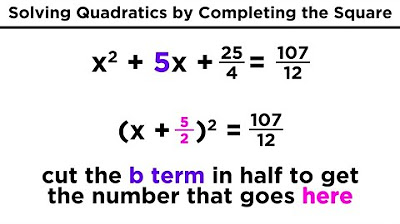Binomial Coefficients | General Formula
TLDRThis tutorial explains how to find the coefficients of specific terms in binomial expansions using the general formula. It covers three problems, demonstrating how to calculate coefficients for terms like 'a^3b', 'y^3', and 'x^2y^4' in respective binomial expansions, providing step-by-step simplifications and final results.
Takeaways
- 😀 The video tutorial focuses on finding coefficients in binomial expansions using the general formula.
- 🔍 The general formula for binomial expansion is \( n \choose r \) \( a^{n-r} \) \( b^r \), where \( n \) is the power, \( r \) is the power of \( b \), and \( a \) and \( b \) are the terms in the binomial.
- 📚 The first problem involves finding the coefficient of \( a b^3 \) in the expansion of \( (a + b)^4 \), which is calculated using \( 4 \choose 3 \).
- 🧩 In the first problem, the coefficient is found to be 4, derived from simplifying the binomial coefficient and the powers of \( a \) and \( b \).
- 🔢 The second problem seeks the coefficient of \( y^3 \) in the expansion of \( (2y - 3)^5 \), where \( n = 5 \) and \( r = 2 \).
- 📉 The coefficient of \( y^3 \) is calculated to be 720, after simplifying the expression involving factorials and powers.
- 📚 The third problem is about finding the coefficient of \( x^2 y^4 \) in the expansion of \( (3x + 2y)^6 \), with \( n = 6 \) and \( r = 4 \).
- 🔍 The coefficient for \( x^2 y^4 \) is determined to be 2160, following the steps of simplifying the binomial coefficient and powers.
- 💡 The tutorial emphasizes the importance of understanding the relationship between \( n \), \( r \), and the powers of \( a \) and \( b \) in binomial expansions.
- 🌟 The video concludes with an encouragement to share the learning and subscribe to the channel for more educational content.
Q & A
What is the general formula used to find the nth term of a binomial expansion?
-The general formula used to find the nth term of a binomial expansion is \( \binom{n}{r} a^{n-r} b^r \), where \( n \) is the power of the binomial, \( r \) is the exponent of \( b \), and \( \binom{n}{r} \) is the binomial coefficient.
What is the coefficient of \( a^b \) to the third power in the expansion of \( (a + b)^4 \)?
-The coefficient of \( a^b \) to the third power in the expansion of \( (a + b)^4 \) is 4. This is calculated using the formula \( \binom{4}{3} \), which simplifies to \( \frac{4!}{(4-3)! \cdot 3!} = 4 \).
How do you determine the value of \( r \) in the binomial expansion formula?
-In the binomial expansion formula, \( r \) is determined by the exponent of \( b \). It is always equivalent to the power of \( b \) in the term you are looking for.
What is the coefficient of \( y^3 \) in the expansion of \( (2y - 3)^5 \)?
-The coefficient of \( y^3 \) in the expansion of \( (2y - 3)^5 \) is 720. This is calculated using the formula \( \binom{5}{2} \cdot 2^3 \cdot (-3)^2 \), which simplifies to \( 5 \cdot 8 \cdot 9 = 720 \).
How do you find the coefficient of \( x^2 y^4 \) in the expansion of \( (3x + 2y)^6 \)?
-The coefficient of \( x^2 y^4 \) in the expansion of \( (3x + 2y)^6 \) is 2160. This is calculated using the formula \( \binom{6}{4} \cdot 3^2 \cdot 2^4 \), which simplifies to \( \frac{6!}{(6-4)! \cdot 4!} \cdot 9 \cdot 16 = 2160 \).
What is the significance of the sum of the powers in a binomial expansion being equal to \( n \)?
-The sum of the powers in a binomial expansion being equal to \( n \) ensures that the terms of the expansion correctly represent the original binomial raised to the power \( n \). It helps in identifying the correct terms and their coefficients in the expansion.
Why is it necessary to use the coefficients of \( a \) and \( b \) when finding a specific term's coefficient in a binomial expansion?
-Using the coefficients of \( a \) and \( b \) is necessary because they affect the value of the term in the expansion. They are part of the general formula and contribute to the calculation of the binomial coefficient and the overall term's value.
How does the binomial coefficient \( \binom{n}{r} \) relate to the terms in a binomial expansion?
-The binomial coefficient \( \binom{n}{r} \) determines the number of ways to choose \( r \) items from \( n \) items, and in the context of binomial expansions, it represents the coefficient of the term where \( b \) is raised to the power \( r \).
What is the role of factorials in the calculation of binomial coefficients?
-Factorials are used in the calculation of binomial coefficients to simplify the expression. They help in reducing the calculation to a more manageable form by canceling out common factors in the numerator and the denominator.
Can the process of finding coefficients in binomial expansions be applied to other algebraic expressions?
-Yes, the process of finding coefficients in binomial expansions can be applied to other algebraic expressions that involve powers and combinations, as the underlying principles of combinatorics and algebraic manipulation are universal.
Outlines
📚 Introduction to Binomial Expansion Coefficients
In this introductory segment, the tutorial begins by recapping the previous lesson on finding the nth term of binomial expansions using the general formula. The focus of this tutorial is to learn how to find specific coefficients using the same general formula. Three problems will be tackled to illustrate this concept, starting with finding the coefficient of ab^3 in the expansion of (a + b)^4. The general formula is outlined, emphasizing that the power of b is equivalent to r. The first problem's solution is then initiated, highlighting that r = 3 and demonstrating the steps to find the coefficient.
🔢 Solving the First Problem: Coefficient of ab^3 in (a + b)^4
The tutorial solves the first problem: finding the coefficient of ab^3 in the expansion of (a + b)^4. Using the formula nCr · a^(n-r) · b^r, where n = 4 and r = 3, it calculates 4C3 as 4. Detailed steps involve factorial calculations and simplifications, ultimately showing that the coefficient is 4.
🔢 Solving the Second Problem: Coefficient of y^3 in (2y - 3)^5
This section addresses the second problem: finding the coefficient of y^3 in the expansion of (2y - 3)^5. Here, n = 5 and r = 2 (since y has a power of 3 and b has a power of 2). The general formula nCr · a^(n-r) · b^r is applied, with specific values substituted. Detailed calculations show that the coefficient of y^3 is 720, achieved through factorial and power simplifications.
🔢 Solving the Third Problem: Coefficient of x^2 y^4 in (3x + 2y)^6
The tutorial solves the third and final problem: finding the coefficient of x^2 y^4 in the expansion of (3x + 2y)^6. With n = 6 and r = 4, the general formula is used again. The calculation involves 6C4, powers of the coefficients 3 and 2, and factorial simplifications. After detailed steps, the coefficient is found to be 2160. The tutorial concludes with a summary and an invitation to subscribe for more educational videos.
Mindmap
Keywords
💡Binomial Expansion
💡Coefficient
💡Combination
💡General Formula
💡Factorial
💡Exponent
💡Negative Coefficient
💡Sum of Powers
💡Simplification
💡Expansion Term
Highlights
Introduction to finding the coefficient of a term in binomial expansions using the general formula.
Explanation of the general formula: n choose r, a^(n-r), b^r.
First problem: Finding the coefficient of a*b^3 in (a+b)^4.
Calculation of the coefficient: 4 choose 3, simplified to 4.
Second problem: Finding the coefficient of y^3 in (2y-3)^5.
Determination of r as 2 for y^3 in the expansion.
Calculation of the coefficient: 5 choose 2, multiplied by 2^3 and (-3)^2.
Simplification of the coefficient to 720.
Third problem: Finding the coefficient of x^2*y^4 in (3x+2y)^6.
Determination of r as 4 for y^4 in the expansion.
Calculation of the coefficient: 6 choose 4, multiplied by 3^2 and 2^4.
Simplification of the coefficient to 2160.
Emphasis on the sum of the powers always being equal to n.
Illustration of how the coefficients are derived from the general formula.
Encouragement to share the learning with colleagues.
Invitation to subscribe to the YouTube channel for more educational content.
Transcripts
Browse More Related Video

Finding the Nth Term in the Binomial Expansion | Binomial Theorem | Pre-Calculus

Binomial distribution | Probability and Statistics | Khan Academy

Finding The Probability of a Binomial Distribution Plus Mean & Standard Deviation

BINOMIAL THEOREM || PRE-CALCULUS

FINDING THE NTH TERM IN THE BINOMIAL EXPANSION || PRE-CALCULUS

Solving Quadratics by Completing the Square
5.0 / 5 (0 votes)
Thanks for rating: